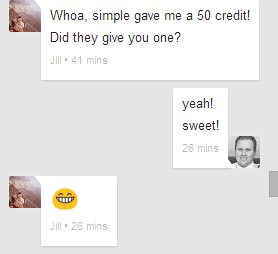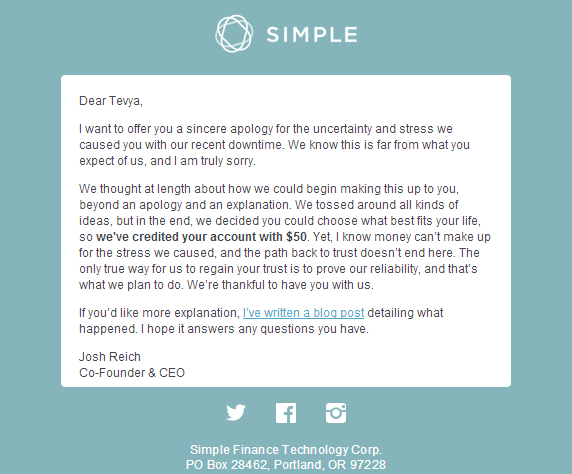Apologizing to customers is an art that many companies struggle to master. However, Simple, an online bank that has redefined modern banking, provides a shining example of how to handle customer frustration, turning challenges into opportunities for loyalty and trust.
 $50! Sweet right? Wanna try this awesome “bank” that not only doesn’t charge fees, but puts their money where their mouth is, literally? It looks like you can now just signup on Simple.com. If that doesn’t work, ping me in the comments or via my contact form and I’ll send you an invite. I currently have 5 available to me. You can also check out the official appology on the Simple Blog.
$50! Sweet right? Wanna try this awesome “bank” that not only doesn’t charge fees, but puts their money where their mouth is, literally? It looks like you can now just signup on Simple.com. If that doesn’t work, ping me in the comments or via my contact form and I’ll send you an invite. I currently have 5 available to me. You can also check out the official appology on the Simple Blog.
Apologize with Transparency
Simple Bank is known for its user-friendly app and straightforward banking services, which include no fees and tools to help users save, budget, and track their spending. However, even the best companies face occasional hiccups, and Simple recently experienced an upgrade that caused a few problems with my card and budget system. At first, I was frustrated, as the issues disrupted my financial plans and “Safe-to-Spend” balance. Despite these challenges, the response from Simple’s customer service has been exceptional.Apologize with Action
After experiencing several issues with my account, I had opened multiple support tickets, though I was initially hesitant to escalate the situation further. I assumed that, like most banks, they wouldn’t reverse any fees or offer solutions beyond their usual terms and conditions. After all, I worked in banking and knew how rigid many financial institutions can be when it comes to refunds and apologies. However, Simple’s customer service proved me wrong. Not only did they apologize for the inconvenience, but they also took immediate action to resolve the issue. Simple not only corrected the problem but also turned my negative experience into a positive one, transforming my initial frustration into gratitude and renewed trust. Their willingness to go above and beyond what was expected is why I now consider Simple not just a service, but a partner in my financial journey.Apologize with Empathy
One of the key aspects that set Simple apart was the way they handled the apology. Unlike many companies that offer a generic response or dismiss the customer’s concerns, Simple showed true empathy. They listened to my concerns, acknowledged the issue, and made sure I knew that they valued me as a customer. The personal touch was clear. Each interaction with their support team was not only professional but also warm and human. It was evident that Simple didn’t just want to fix the issue for me; they wanted to ensure I felt heard and appreciated. They understood that the service they provided had a real impact on my daily life, and they made it their priority to fix the problem as swiftly and seamlessly as possible.Apologize and Turn Frustration into Loyalty
It wasn’t just about fixing the immediate issue; it was about rebuilding trust. I was impressed by how Simple took my frustration and turned it around by providing a resolution that felt thoughtful and genuine. This kind of customer service doesn’t just fix a problem—it creates lasting loyalty. They didn’t merely address my issue; they made me feel like a valued part of their community. In a world where most customers expect automated responses and faceless communication, Simple’s approach to customer service was a breath of fresh air. I’ve had my share of frustrations with other companies, but this experience with Simple reminded me of how an apology done right can lead to stronger customer relationships. They apologized in a way that actually made me more loyal to their service, which is something that most businesses could learn from.Apologize and Go Beyond
Even after I received my refund and had my issues resolved, Simple didn’t stop there. They went a step further to ensure that I felt confident in their ability to prevent future problems. Their support team provided me with updates on what they were doing behind the scenes to fix the issue, and they assured me that they were working to improve the system for all users. It’s this level of attention to detail that made me feel not just like a customer, but like a part of a growing and responsive organization. Simple didn’t just fix the problem—I felt as though they genuinely cared about preventing similar issues for others, making me more likely to recommend their service to friends and family.Conclusion: The Power of a Good Apology
When a company truly apologizes, it does more than just offer an explanation—it strengthens the relationship with the customer. Simple Bank’s example shows how a thoughtful apology, backed by action, can transform a potentially negative experience into a positive one. Through transparency, empathy, and proactive measures, Simple not only solved the issue but also reinforced my trust in them. Their approach to customer service is a model for how to turn an unhappy customer into a loyal advocate. If more companies could apologize in this manner, customer loyalty would be far higher, and businesses would see greater long-term success. I’d resolved to tough it out, and get my goals and such straightened out and not say anything. But it was definitely making me rethink my previous support and recommendation of Simple. Then only half an hour ago, I return to my desk to find the email you see above, in my inbox. On chat, a message from my wife: $50! Sweet right? Wanna try this awesome “bank” that not only doesn’t charge fees, but puts their money where their mouth is, literally? It looks like you can now just signup on Simple.com. If that doesn’t work, ping me in the comments or via my contact form and I’ll send you an invite. I currently have 5 available to me. You can also check out the official appology on the Simple Blog.
$50! Sweet right? Wanna try this awesome “bank” that not only doesn’t charge fees, but puts their money where their mouth is, literally? It looks like you can now just signup on Simple.com. If that doesn’t work, ping me in the comments or via my contact form and I’ll send you an invite. I currently have 5 available to me. You can also check out the official appology on the Simple Blog.



0 Comments